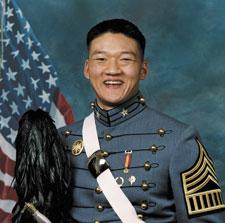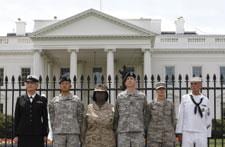
Dan Choi. Credit: xtra files
Ask Dan Choi about the first gay pride celebration he attended, and he smiles sheepishly.
“You know, I’m sort of embarrassed to say,” he replies. “The first was when I was grand marshal of San Francisco Gay Pride.”
And how long ago was that?
“A year ago,” he replies, smiling again.
Choi is a first lieutenant in the United States Army, a West Point graduate and a veteran of the Iraq war. His first Pride experience came not long after he came out very publicly on The Rachel Maddow Show. His choice to so openly defy the US military’s Don’t Ask, Don’t Tell policy almost instantly made him one of the most famous gay people in the US.
“Seeing a million people out in the streets when I went up the hill a bit was absolutely stunning,” Choi says of his first Pride. “I started tearing up, seeing that these were the people I had wanted to meet my entire life.”
Now he has about a dozen Pride parades under his belt, most recently New York City’s on June 27. He was grand marshal at that one, along with activists Judy Shepard and Constance McMillen. Choi says the three of them have one thing in common: they speak out on the issues that are most important to them.
Watch our video interview with Choi:
“We’re certainly people who just refused to shut up,” says Choi. “That shouldn’t be considered an anomaly. That should be the standard.”
Choi says he is surprised that he is still deluged with requests to talk about Don’t Ask, Don’t Tell and gay people in the US military.
“I had no idea that I would be sitting here today, a year and a half later, continuing to talk about it,” he says. “I thought I was just going to make my contribution and allow the organizations to run with it if they wanted, then go back to studying at Harvard.”
When he came out, Choi admits that he knew very little about gay lobby organizations.
“I learned in Iraq that there are many different tribes and many different organizations, but it wasn’t confusing in the least bit compared to the real labyrinth that gay politics is,” he laughs.
As Choi navigated that labyrinth, he became disillusioned with the status quo of the US gay movement. He says he was “absolutely disappointed” in some of those who profess to be political insiders — leaders — in the US gay community.
“I felt that there were a lot of organizations that just didn’t portray my truth in the way that I wanted to portray it,” he says. “My only goal is to be unashamed of what I’m saying, and if that’s wrong messaging, then we have to think about the difference between right and wrong.”
Choi found himself drawn to GetEQUAL, a loosely organized group of gay activists who are causing big headaches for gay leaders. While LGBT rights groups like Human Rights Campaign (HRC) diplomatically lobby members of the US Congress, GetEQUAL activists heckle legislators at committee hearings and organize sit-ins in their offices.
“The fact of the matter is that in any movement you really need those people who are on the inside, and you have to have those people on the outside,” says Choi. “I’m not afraid to say that we have taken on a role on the outside.”
When, for example, Choi, dressed in his US Army uniform, chained himself to the fence in front of the White House, it was media gold. But some gay leaders derided him.
“A lot of people have said, ‘You don’t know what you’re doing. You have really put a turd in the punch bowl at our cocktail party,’” says Choi.
But criticism from those who are supposed to represent him hasn’t stopped Choi.
“I’m not going to live in political theories or predictions,” he says. “All I’m going to do is continue taking action. All I’m going to do is continue standing up. If people want to call me naive for taking action, then I would rather be called naive than all those other things history is going to call those who didn’t do anything.”

 Why you can trust Xtra
Why you can trust Xtra


